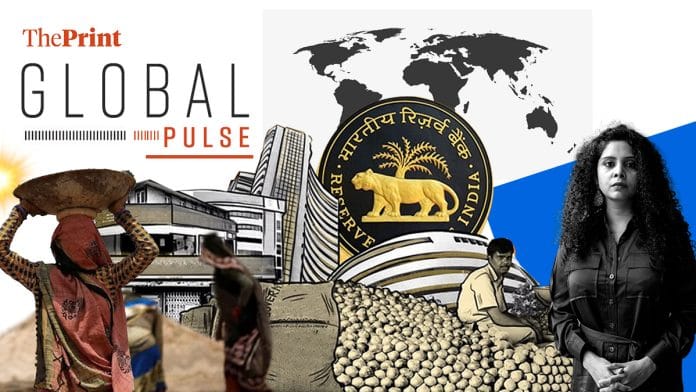New Delhi: Global media is extremely concerned about the Indian economy “losing steam” with a BBC analysis saying that while Finance Minister Nirmala Sitharaman has painted a bright picture, the numbers show something else.
Though India is still a robust economy with high growth numbers compared to developed countries, the slump in Gross Domestic Product (GDP) growth signals a slowdown, it says. Some argue that the central bank’s efforts to curb inflation have restricted interest rates, potentially harming growth, the article adds.
In the analysis, ‘India: Is the fastest-growing big economy losing steam?’, BBC correspondent Soutik Biswas further says that the Indian economy is operating on a “two-speed trajectory” with an “old economy and a new economy”.
“The old economy comprising the vast informal sector, including medium and small scale industries, agriculture and traditional corporate sector, are still waiting for long-pending reforms,” the BBC report says. “In contrast, the new economy, defined by the boom in services exports post-Covid, experienced robust growth in 2022-23.”
Outsourcing has driven this growth with India taking its place on the global stage as a hub for global capability centres.
“So the old economy appears to lack a growth catalyst while the new economy slows. Private investment is crucial, but without strong consumption demand, firms will not invest. Without investment to create jobs and boost incomes, consumption demand cannot recover,” the BBC summarises.
The article also says that critics have issued warnings about “hyping up the narrative” of the Indian growth story. “In other words, India requires a significantly higher and sustained growth rate to generate more jobs and raise incomes,” it concludes.
In a Bloomberg opinion article, columnist Andy Mukherjee echoes an argument the BBC alludes to: policymakers aren’t doing enough to prevent the Indian economy from slipping back into a rut.
“In the absence of meaningful private investment and job creation, India is slipping back into its pre-COVID-19 rut, and its economic czars are once again publicly refusing to acknowledge the slowdown, blaming a long and busy election season for tepid public spending,” he writes in the article headlined ‘India Is Sacrificing Growth. It Needs to Stop’.
“Privately, though, they seem to be worried enough to abruptly shuffle a key decision maker,” he says, referring to the appointment of a new Reserve Bank of India (RBI) governor.
“Yet the big discussion within the country, divorced from the grim reality of the present day, is about whether India will be a developed country by 2047, the centenary of its independence from British rule,” the column concludes.
While the BBC and Bloomberg analyse the economy from a policymaking lens, The Guardian takes a deeper look at the grim reality of being part of the labour force in an article headlined ‘I feel dizzy but I can’t stop’: global heating is already making kiln workers’ lives unbearable. And it will only get worse.
The newspaper shadowed workers across Bihar as they worked in brick kilns during India’s longest-ever heatwave this summer.
“Heatwaves in India are projected to become more intense, last longer and occur at a higher frequency and earlier in the year, and the northern states, including Bihar—which have the highest concentration of brick kilns, themselves a contributor to rising temperatures—will see the most brutal temperatures,” the article says.
It quotes new research from the University of Nottingham that says brick kiln workers are among the most vulnerable to human-caused global warming and, even in the most optimistic scenario, people will be working in hotter temperatures at the majority of brick kilns by 2050.
Their need to make money makes “them particularly vulnerable to heatstroke, dehydration and long-term disease”, The Guardian reports.
Highlighting these risks could lead to a “discussion among policymakers and employers about workers’ rights, including improved conditions and a fairer payment system,” it notes.
In a Washington Post opinion column, Rana Ayyub writes about what it’s like when journalists become the story—even though they never should.
In the article headlined ‘The life of a journalist in India: Doxed, stalked, criminally charged,’ she describes how she was doxed in November. Ayyub further talks about how she faces relentless harassment as a Muslim journalist in India who is critical of the government.
“Over the years, I have been made acutely aware that the multiple identities I wear put me at risk as a journalist in India: an outspoken woman, a critic of the government and a Muslim,” she writes.
The ruling Bharatiya Janata Party (BJP) and Right-wing supremacists increasingly target journalists who push back against the narrative set by the government, she writes, citing India’s decline in press freedom indices.
As a Muslim journalist, she further says, “My journalism is not viewed through the same lens of objectivity as the work of my fellow non-Muslim journalists because I am presumed to be disloyal to my country by virtue of my faith.”
She adds, “Each time the doorbell rings, I wonder if it’s the postman with the mail or a cop with a warrant. I spend more time in courtrooms than I do chasing stories.”
(Edited by Sanya Mathur)
Also Read: Global Times says Congress making ‘noise’ on India-China & Centre ‘pins blame’ for slowdown on RBI






